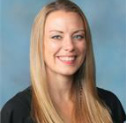When schools across Illinois shut down because of COVID-19, some students at Homewood-Flossmoor High School had a difficult time learning from home and staying on track with coursework. The number of incomplete courses or failures had faculty and staff devise creative approaches to help dozens of students catch up with graduation credit requirements during the 2020-21 school year.
Today some of those special services are still helping students stay on track.
Teachers realized that remote learning removed them from monitoring what was happening in a classroom setting. At the end of the first semester, student grades showed 2,620 incomplete courses. Jennifer Rudan, Multi-Tiered System of Support coordinator, stressed that the number is credits and not the number of students. Still, the number was startling and reflected the general setbacks of learning at home, she told members of the District 233 school board’s planning committee on Jan. 26.
For those students still struggling, H-F faculty devised a tiered recovery system. The faculty believed there had to be a way to improve the outcomes, and on closer examination they found that many students were going to fail a course because they may not have taken a test or turned in a report. Rudan said this was designated Tier 1 and faculty wrote 140 individual recovery “catch-up” plans. Most students were in trouble in one or two classes.
“There’s a lot of work that goes on to get kids to a passing grade,” she explained. “It’s substantially beneficial for our students to recover credit by working over the winter break.” The statistics show 108 of the 140 students offered a plan completed the missing assignments. Rudan said a little over 400 courses were passed in that recovery period.

In Tier 2, faculty gave students a chance to prove they were proficient enough to earn credit. Of the 89 students offered this option, 50 passed the test and showed proficiency.
Tier 3 students needed remedial work. Faculty devised a system to help students learn what they’d missed in fall semester.
Rudan said, “We created two sections of a biology class and two sections of Algebra 1, a section of geometry and a section of Algebra 2 with teachers working with students to reteach first semester context the students may have missed” and get them started on second semester material.
“We really worked to get students back on track for graduation,” she said, and 66 of the 107 students offered the Tier 3 option were able to catch up with their peers.
For those who fell behind, H-F offered summer school courses to help them earn the missing credits.
Rudan said by the end of the 2021-22 school year, H-F faculty were able to reduce the number of incompletes from 2,620 courses down to 554.
“Students that didn’t take any of these recovery plans or fall into these tiers, the recovery plans were rolled into their schedule for this year,” Rudan told committee members.
Faculty continue to monitor student progress and Rudan said having students at school has made quite a difference. Looking at the fall 2022 semester, H-F recorded 1,937 incomplete credits, compared with the 2,620 of last year. The faculty again devised “catch up” plans for students and got the incomplete or failed credits down to 628 credits by the start of second semester.
“I do know that compared to last year our kids are doing much better this year and when we ran the actual number after marking day (failures were) cut again by more than 50%,” she said.
About 100 students are getting special instruction this semester to try and get them the credit they need. Unlike last year, they will not be in a second semester classroom doing first semester work. Students will be using their seminar period to meet with teachers who will help them catch up.
H-F used federal Elementary and Secondary School Emergency Relief funds, part of the American Rescue Plan, to hire a student support counselor who is the point person managing all the recovery plans for students.
“We’re really working toward a proactive future. We’re not waiting until the end of the semester to catch students up,” Rudan said.

